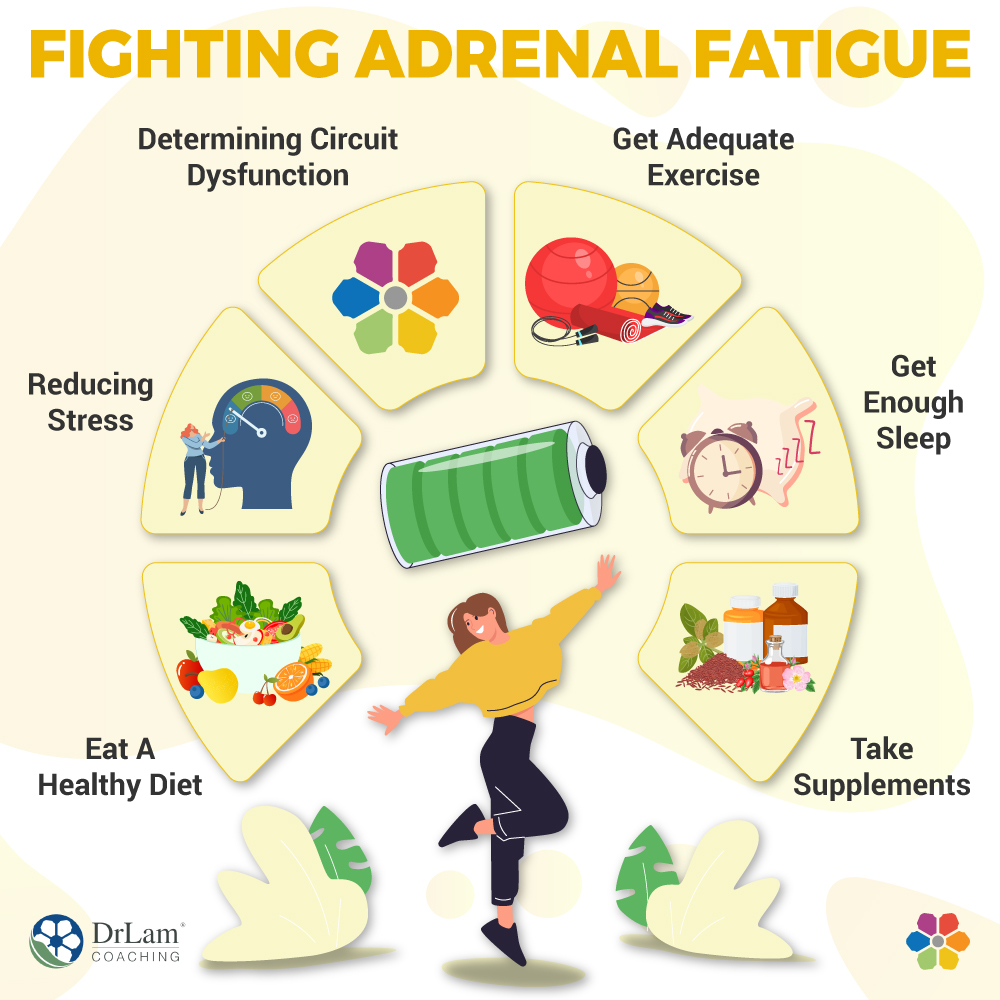Do you feel tired all the time? Or you just can’t get a good night’s rest? Perhaps you have some kind of brain fog? Maybe you even get anxious and depressed from time to time? You may have a condition known as adrenal fatigue. There has been much talk lately about this condition, with many even questioning its existence altogether. But is it real or another medical make-believe? Let’s find out.
 Adrenal Fatigue Syndrome (AFS), or simply adrenal fatigue, can be described as a condition where the body’s stress response cannot cope with life’s chronic stressors. The condition is characterized by a collection of related signs and symptoms (a syndrome) that can significantly impact the quality of life.
Adrenal Fatigue Syndrome (AFS), or simply adrenal fatigue, can be described as a condition where the body’s stress response cannot cope with life’s chronic stressors. The condition is characterized by a collection of related signs and symptoms (a syndrome) that can significantly impact the quality of life.
The first recorded use of the term “adrenal fatigue” was in 1998 by a chiropractor, James Wilson. He stated that the condition occurs when the adrenal glands function below the necessary level. Since 1998, there have been several studies into the condition. However, conventional medicine does not recognize adrenal fatigue as a medical condition.
Adrenal fatigue should not be mistaken for adrenal insufficiency (Addison’s disease), a medically-recognized disorder in which the adrenal glands don’t produce enough cortisol. Adrenal insufficiency is typically due to autoimmunity, a condition where the body attacks itself.
Moreover, proponents of adrenal fatigue often term it the non-Addison’s form of adrenal dysfunction, again emphasizing that this condition is not the same as Addison’s disease.
When the body is stressed, it signals the pituitary gland to release the adrenocorticotropic hormone (ACTH). In turn, the ACTH prompts the adrenal glands to release cortisol, the hormone responsible for regulating the body’s stress response by mediating a wide range of biological processes. After the stress source is neutralized, the body stops producing cortisol, signaling the end of the stress response.
While that seems simple enough, the body’s stress response actually spans several organs and systems equipped to manage stress in the body. These organs and systems form the NeuroEndoMetabolic (NEM) Stress Response, which is the inbuilt stress-coping mechanism in the body.
The NEM response is comprised of six circuits: Hormone, Bioenergetics, Detoxification, Inflammation, Cardionomic, and Neuroaffect. Further, the different organs and systems involved in the stress response fall into at least one of these circuits.
Although the NEM circuits can effectively manage stress in the body, they may dysregulate if stress gets chronic or due to some medical conditions. The circuit that is most affected often dictates the symptoms of stress the individual observes.
With chronic stress, the adrenal glands produce more cortisol hormone to satisfy the demands of the stress response system. This indicates the beginning of adrenal fatigue. If the chronic stressor persists, the adrenal glands become exhausted or “fatigued,” eventually dropping cortisol production. This signals the advanced stages of adrenal fatigue.
Today, many health experts believe adrenal fatigue is a myth. In fact, the Endocrinology Society categorically states that “no scientific proof exists to support adrenal fatigue as a true medical condition.” And admittedly, there is no scientific proof to support the existence of adrenal fatigue. One 2016 review of 58 studies concluded that there is “no substantiation that adrenal fatigue is an actual medical condition,” therefore, terming it a myth.
Perhaps the most recurring reason conventional medicine practitioners give for not believing in adrenal fatigue is the generality of the symptoms. Essentially, mainstream medicine believes the symptoms of AFS are so general that they can point to many different health conditions. This is why many health practitioners manage AFS in their patients as they do depression.
 This means that, despite the inability of many mainstream medical practitioners to explain the persistent symptoms that characterize AFS, they remain resolute in their belief that adrenal fatigue is not real.
This means that, despite the inability of many mainstream medical practitioners to explain the persistent symptoms that characterize AFS, they remain resolute in their belief that adrenal fatigue is not real.
However, just because AFS leads to a wide range of symptoms, this does not necessarily mean that these symptoms do not share a cause.
In fact, this is not the first time conventional medicine has shown extended skepticism with a condition like this, as something similar happened with Chronic Fatigue Syndrome.
In this case, while many health experts recognized the symptoms their patients reported to be consistent with Chronic Fatigue Syndrome, it still took decades before the Institute of Medicine recognized the condition. It is likely this route is also being followed with AFS.
In sum, while AFS has not been proven scientifically, it is impossible to ignore the symptoms of patients and the advice of health professionals with experience in adrenal fatigue.
There are many different symptoms of adrenal fatigue, depending on the circuit that dysregulates. They include:
Evaluating adrenal fatigue medically can be tricky, especially when the medical professional has little experience and knowledge of the condition.
A common practice in labs today when assessing people that report AFS symptoms is the saliva cortisol test, which measures cortisol levels.
However, the saliva cortisol test is an unreliable evaluation option for adrenal fatigue, as cortisol levels vary from individual to individual. Also, cortisol levels fluctuate during the day, normally peaking in the early morning and declining throughout the day.
While cortisol levels are still outside normal ranges during AFS, it is still crucial to see a medical practitioner experienced in AFS for proper evaluation. Even better, individuals with adrenal fatigue should try to see a medical professional that has had personal experience with the condition.

After proper evaluation and assessment of the condition by a health professional experienced with adrenal fatigue, the next step is devising an appropriate management pathway. While managing the condition depends on the needs of the specific individual, there are still some generally useful management strategies. They are as follows:
Adrenal fatigue is caused by chronic stress, so it only makes sense that reducing stress is the first step to managing the condition. However, it’s not always that easy.
If there is an identified stressor, the individual needs to make conscious efforts to resolve it. For physical stressors, like injury or an underlying medical condition, the affected person should see a medical practitioner to resolve the issue.
It is more difficult if the stressors are mental or situational. For instance, a person that loses a loved one may be depressed and emotionally unbalanced, which can take a toll on the body’s stress response after a while. Likewise, losing one’s job can plunge one into financial difficulties, which can bring many other issues that can result in chronic stress. In this case, improving coping skills and emotional processing may help.
While reducing stress may not be easy, it is necessary for managing adrenal fatigue. Even if other management options are considered, if the stressor persists, the condition will remain. Several techniques can also improve the body’s ability to cope with stress, including yoga, deep breathing, and meditation.
 As with most conditions, improving diet can help manage adrenal fatigue.
As with most conditions, improving diet can help manage adrenal fatigue.
Firstly, it is necessary to avoid inflammatory foods. This is because chronic inflammation can adversely impact the organs responsible for managing stress. Also, chronic inflammation can lead to several health conditions, further raising the stress levels in the body.
Examples of foods that cause inflammation include red and processed meat, refined grains, gluten, sodas, artificially-sweetened drinks, and deep-fried foods. In contrast, foods that help combat inflammation include tomatoes, green leafy vegetables, nuts, berries, avocados, olive oil, and green tea.
Other useful foods to include in diet plans are whole grains, whole fruits, legumes and beans, lean animal protein, and vegetables.
Aside from specific foods, it is essential to adjust eating practices. If you have adrenal fatigue, ensure you always have a protein-rich breakfast that is low in sugar to help balance cortisol levels throughout the day. Additionally, ensure you keep your body replenished through the day by eating regularly to restore depleted energy levels.
There are six circuits in the NEM that work together to ensure the body effectively manages stress. When one or more of these circuits dysregulate for an extended period, adrenal fatigue may result. Furthermore, the symptoms the individual observes will be impacted by the circuit that dysregulates.
Therefore, it is key to determine the circuit that dysregulates to fight adrenal fatigue. This is not the easiest thing to do, especially on your own. However, outlined below are the typical markers of the dysregulation of each circuit.
After the dysregulated circuit has been determined, the next step is to target the root cause of the dysregulation. This may involve seeing your doctor for an examination of the related organs and systems.
Over the last few years, supplement use in the United States has skyrocketed. There are many different types of supplements today claiming different health benefits.
Some supplements may also help manage adrenal fatigue. They include red yeast rice, rosehip oil, serrapeptase, ashwagandha, and glutathione. Vitamins like vitamin C, vitamin B5, vitamin E, and vitamin D are also commonly used in managing AFS.
While supplement use can be an important management option, individuals still need to be careful while taking them. The FDA does not impose as strict of regulations on supplements as it imposes on medications. Therefore, there is no certainty that many of these supplements comply with their stated ingredients and benefits.
To be safe, only get supplements from licensed and reputable sources. In addition, ensure you speak to your healthcare provider before incorporating any supplement into your diet. If you have AFS, you can be especially sensitive to supplements, so it is especially important to talk to a doctor aware of AFS first. Finally, supplements should not replace healthy eating.
 The health benefits of regular exercise have been confirmed in multiple scientific research and trials. Exercise can also help with adrenal fatigue, as studies show exercise can help relieve stress in the body.
The health benefits of regular exercise have been confirmed in multiple scientific research and trials. Exercise can also help with adrenal fatigue, as studies show exercise can help relieve stress in the body.
The CDC recommends 150 minutes of moderate-intensity exercise or 75 minutes of high-intensity exercise weekly.
However, people with adrenal fatigue may not be in the best physical condition to comply with this guideline. It's important to avoid overexercising with AFS, as this can cause an adrenal crash. But very gentle exercise is a good place to start. You can start with very mild routines, such as walking or yoga, eventually working your way to more intense physical activities.
Suppose you are physically fit but don’t have enough time. In that case, you can consider a type of exercise known as high-intensity interval training, alternating short bursts of intense exercise with lower-intensity recovery periods.
A good night’s sleep can help the body tackle stress better and restore homeostasis.
However, sleep is one aspect of life that is affected by adrenal fatigue. People with the condition often have sleep disorders and difficulty waking in the morning. Some people also wake up drained of energy and motivation and need stimulants to start their day.
To manage adrenal fatigue, good sleep is critical. There are many tips for getting quality sleep, and they include:
If you notice that your sleep quality is not improving regardless of what you try, you may need to get a sleep test.
Adrenal fatigue syndrome (AFS) is a chronic condition that results when the body’s stress response cannot cope with life’s stressors. Although this condition has not been recognized by mainstream medicine, it is one that very much exists. To effectively manage the condition, ensure you see a health professional with experience with the AFS. You should also follow the following steps:
For more information about how to cope with adrenal fatigue, the team at Dr. Lam Coaching can help. We offer a free, no-obligation phone consultation at +1 (626) 571-1234 where we will privately discuss your symptoms and various options. You can also send us a question through our Ask The Doctor system by clicking here.

All in one adrenal, liver, and gut support
Yes, absolutely! Some supplements are commonly used for managing adrenal fatigue because they directly or indirectly influence stress management. However, supplements are not subject to the same strict regulations the FDA subjects medications to, so you need to be careful when taking them.